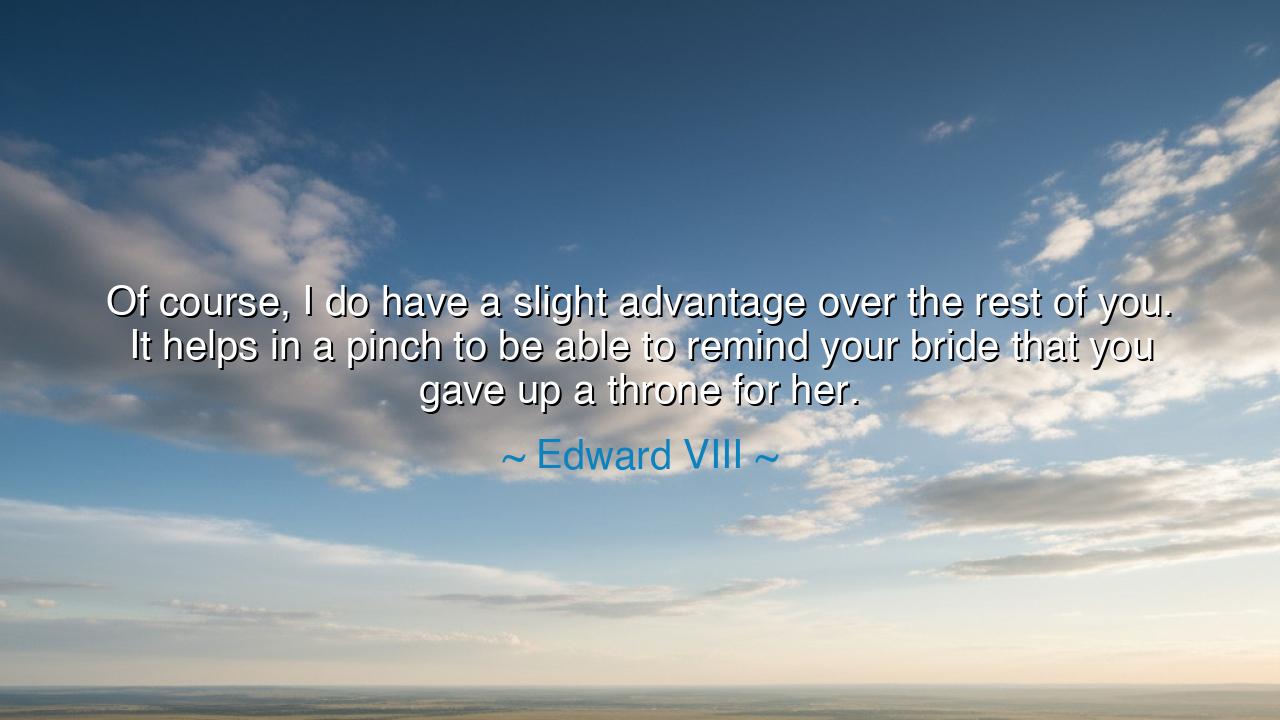
Of course, I do have a slight advantage over the rest of you. It
Of course, I do have a slight advantage over the rest of you. It helps in a pinch to be able to remind your bride that you gave up a throne for her.






The words of Edward VIII resound with both irony and depth: “Of course, I do have a slight advantage over the rest of you. It helps in a pinch to be able to remind your bride that you gave up a throne for her.” At first, they appear as jest, a light remark to charm his listeners. Yet beneath the humor lies a truth of immense weight: the sacrifice of worldly power for the sake of love. In this statement, Edward reminds us that even a crown, with all its majesty, is less than the union of two souls bound by choice.
To surrender a throne is no small thing. Thrones are symbols of dominion, continuity, and the weight of nations. Kings and emperors through history have waged wars, shed blood, and even slain kin to seize or preserve them. And yet here was a man who laid one aside not for conquest but for companionship, not for glory but for the hand of his beloved. In this, he revealed a truth known to poets and sages alike: that love may demand what duty forbids, and sometimes the heart must triumph over the crown.
The world remembers how Edward VIII abdicated the throne of England in 1936 for the woman he loved, Wallis Simpson. His choice shocked empires, for it was unheard of that a king should step down willingly. In doing so, he fulfilled the very essence of his words: his “advantage” in marriage was the unshakable proof that no burden, not even the weight of kingship, was too great to be cast aside for the sake of love. His sacrifice became both scandal and legend, a parable retold for generations.
In this, we see a reversal of values. Where the world prizes crowns, Edward revealed that the true crown lies in loyalty to the heart. For what is the worth of power if one cannot share it with the beloved? What is the glory of empire if one walks its halls alone? His choice teaches that greatness is not always in ruling millions, but in binding oneself to another, wholly and without reserve.
Therefore, let this wisdom endure: love demands sacrifice, and the proof of devotion is not in words but in deeds. A man who gave up a throne showed that the highest victory is not won on battlefields or within palaces, but in the surrender of pride for love. In this way, Edward VIII became not just a king in history, but a lesson for all time—that in the end, crowns fade, empires fall, but the bond of bride and groom remains eternal.






HNhoan nguyen
There’s an undeniable charm in this quote—it’s playful, almost self-deprecating, yet it carries immense historical weight. It reminds me how love can elevate even the most powerful to acts of vulnerability. Still, I can’t help but ask: was his gesture truly romantic, or reckless? Can love remain pure when it’s so deeply entangled with politics, power, and the judgment of an entire nation?
MDMinh Dinh
I find this quote both endearing and revealing. It captures Edward VIII’s wit but also his need to justify a controversial choice. It makes me think about the dynamics of love and sacrifice—how much is too much to give up for another person? If one’s identity or duty is relinquished entirely for love, does that love strengthen, or does it become burdened by imbalance and dependency?
1NMinh Thu 10A2 Nguyen
What strikes me is the irony in this statement. He’s clearly aware of the power his story holds—how few people can say they gave up a throne for love. But that also makes me wonder: did this act make his love more authentic, or more symbolic? Was it a personal choice or a performance that history romanticized beyond recognition? Sometimes, the line between devotion and defiance blurs.
DNDuong Nguyen
This line fascinates me because it reveals how pride and love intertwine. Edward VIII’s remark sounds lighthearted, but it also carries a quiet assertion of worth: ‘I gave up everything for love.’ It raises a question—do we sometimes use our sacrifices as leverage in relationships, even unconsciously? Is true love selfless, or does it always come with the expectation of acknowledgment and gratitude?
TTHao Tran Tu
I can’t help but sense a bittersweet tone here. On one hand, it’s charming that he could joke about such a monumental decision. On the other, it feels like he’s subtly reminding himself—and others—of the price he paid. Was this humor a coping mechanism? It makes me question whether great sacrifices in love ever feel fully worth it, especially when history keeps your choice under constant scrutiny.